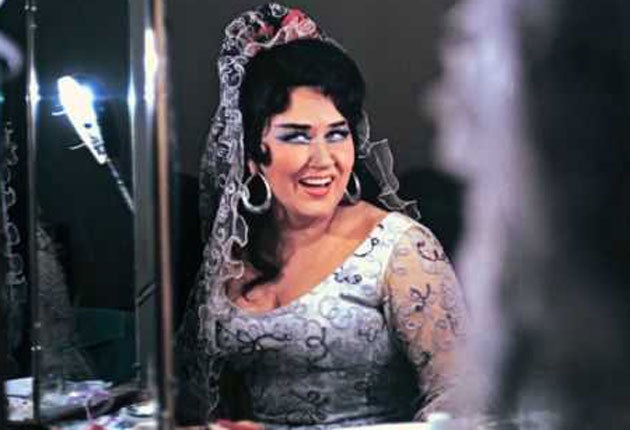Irina Arkhipova: Mezzo celebrated for her portrayal of Bizet's Carmen

Your support helps us to tell the story
From reproductive rights to climate change to Big Tech, The Independent is on the ground when the story is developing. Whether it's investigating the financials of Elon Musk's pro-Trump PAC or producing our latest documentary, 'The A Word', which shines a light on the American women fighting for reproductive rights, we know how important it is to parse out the facts from the messaging.
At such a critical moment in US history, we need reporters on the ground. Your donation allows us to keep sending journalists to speak to both sides of the story.
The Independent is trusted by Americans across the entire political spectrum. And unlike many other quality news outlets, we choose not to lock Americans out of our reporting and analysis with paywalls. We believe quality journalism should be available to everyone, paid for by those who can afford it.
Your support makes all the difference.The Russian mezzo Irina Arkhipova was one of the finest singers to come out of the Soviet Union in the period after the Second World War. Her voice was wide in range and even throughout its compass, with no perceptible "gear change" between the registers. Perfectly suited, vocally and dramatically, to the operas of Tchaikovsky, Mussorgsky and Prokofiev, she also sang the great Verdi mezzo roles, in particular Amneris in Aida and Azucena in Il trovatore, with great success, both in Russian and Italian. Her favourite non-Russian part, however, was the heroine of Bizet's Carmen. In a career that lasted over 40 years she appeared at La Scala, Milan, the Paris Opéra, Covent Garden and other Western opera houses, but her home theatre was always the Bolshoi in Moscow.
Irina Konstantinovna Arkhipova was born in Moscow in 1925. Her mother had sung in the chorus of the Bolshoi, but had given up her career when she married. After being evacuated to Tashkent during the war, Arkhipova studied at the Moscow Institute of Architecture, graduating in 1948. She had already begun to study singing with Nadezhda Malyshia, then went to the Moscow Conservatory, where she studied with Leonid Savransky, graduating in 1953.
After failing an audition at the Bolshoi, she joined the Sverdlovsk (now Ekaterinburg) Opera, making her debut in 1954 as Lyubasha in Rimsky-Korsakov's The Tsar's Bride. One of her roles was Carmen; this was so successful that in the middle of her second season at Sverdlovsk she was transferred back to Moscow and made her debut at the Bolshoi in 1956 as the Spanish gypsy.
Arkhipova's repertory now began to expand. She sang Joan of Arc in Maid of Orleans and Lyubov in Mazeppa, both by Tchaikovsky, as well as Hélène in the first Bolshoi performance of Prokofiev's War and Peace in 1959. The following year her international career began with three performances of Carmen at the San Carlo, Naples, which were expremely well received.
In 1964 the Bolshoi visited La Scala with, among other operas, War and Peace with Arkhipova as Hélène; as a result she was invited back to Milan in 1967 to sing Marfa in Khovanchshina (in Italian) with the Scala company. She returned the following year as Marina in Boris Godunov. She also sang Marina (this time in Russian) when the Bolshoi visited the Paris Opéra in 1969. These two Mussorgsky roles showed the mezzo at her artistic peak, in complete control of her vocal and dramatic means. They are both recorded on disc.
Another of Arkhipova's favourite roles was Azucena in Il trovatore. She sang it at Wiesbaden in the spring of 1972, at the Orange Festival later in the year, in Buenos Aires in 1974, for her Covent Garden debut in 1975, at Geneva in 1978 and with the Royal Opera at the Palace Theatre in 1983. That Manchester performance was particularly fine; always in total command of the stage, she did not overdo the pathos of the character (another gypsy), but emphasised (as in Carmen) her fierce independence. Meanwhile, she sang Amneris in San Francisco in 1975 and returned to Paris in 1975 for the Nurse in Dukas' Ariane et Barbe-Bleue.
The Bolshoi celebrated the 20th anniversary of her debut with Carmen in 1976 and she sang Lyubov in Mazeppa at Amsterdam in 1980 and at the Bolshoi in 1986, her 30th anniversary; Marina at the Athens Festival in 1982 was followed by Marfa in Savonlinna in 1987. The following year she returned to Covent Garden as Ulrica – or rather Madame Arvidson in the Swedish version of Verdi's Un ballo in maschera. Though she was now in her 60s, Arkhipova's voice kept all its strength and beauty. In the 1990s she took on contralto roles in two Tchaikovsky operas, the old Countess in The Queen of Spades, which she sang with the Kirov Opera at the Metropolitan in New York and Filipyevna, the nurse in Eugene Onegin, at the Châtelet in Paris. Arkhipova became chairman of the Moscow-based Arkhipova Foundation, set up by the composer Tikhon Khrenikov in 1993 and travelled widely teaching, judging competitions and trying to help a new generation of young singers in the difficult conditions of what was once the Soviet Union.
Elizabeth Forbes
Irina Konstantinovna Arkhipova, opera singer, recitalist and teacher: born Moscow 2 December 1925; twice married (one son (deceased); died Moscow 11 February 2010.
Join our commenting forum
Join thought-provoking conversations, follow other Independent readers and see their replies
Comments